ACCA P1专业会计师知识点和技巧(5)
acca答题技巧
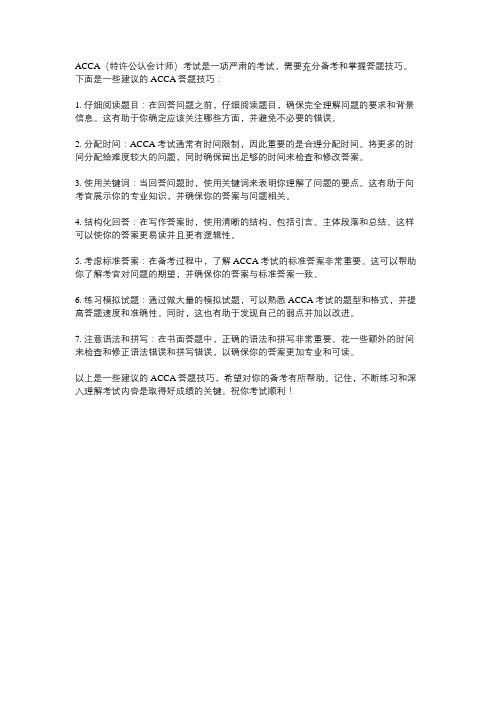
ACCA(特许公认会计师)考试是一项严肃的考试,需要充分备考和掌握答题技巧。
下面是一些建议的ACCA答题技巧:
1. 仔细阅读题目:在回答问题之前,仔细阅读题目,确保完全理解问题的要求和背景信息。
这有助于你确定应该关注哪些方面,并避免不必要的错误。
2. 分配时间:ACCA考试通常有时间限制,因此重要的是合理分配时间。
将更多的时间分配给难度较大的问题,同时确保留出足够的时间来检查和修改答案。
3. 使用关键词:当回答问题时,使用关键词来表明你理解了问题的要点。
这有助于向考官展示你的专业知识,并确保你的答案与问题相关。
4. 结构化回答:在写作答案时,使用清晰的结构,包括引言、主体段落和总结。
这样可以使你的答案更易读并且更有逻辑性。
5. 考虑标准答案:在备考过程中,了解ACCA考试的标准答案非常重要。
这可以帮助你了解考官对问题的期望,并确保你的答案与标准答案一致。
6. 练习模拟试题:通过做大量的模拟试题,可以熟悉ACCA考试的题型和格式,并提高答题速度和准确性。
同时,这也有助于发现自己的弱点并加以改进。
7. 注意语法和拼写:在书面答题中,正确的语法和拼写非常重要。
花一些额外的时间来检查和修正语法错误和拼写错误,以确保你的答案更加专业和可读。
以上是一些建议的ACCA答题技巧,希望对你的备考有所帮助。
记住,不断练习和深入理解考试内容是取得好成绩的关键。
祝你考试顺利!。
acca会计学 知识点
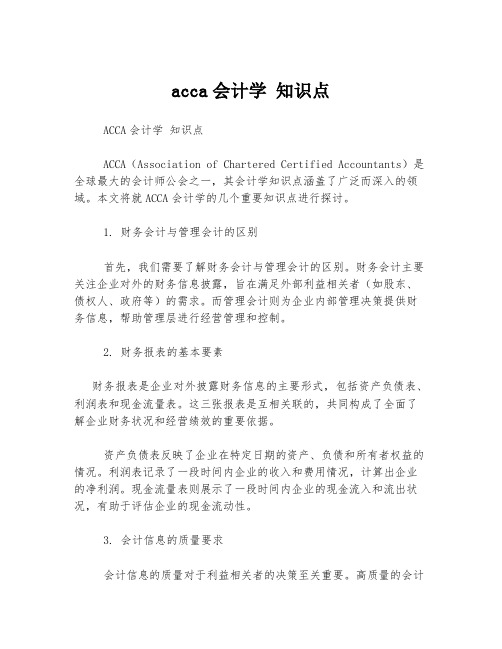
acca会计学知识点ACCA会计学知识点ACCA(Association of Chartered Certified Accountants)是全球最大的会计师公会之一,其会计学知识点涵盖了广泛而深入的领域。
本文将就ACCA会计学的几个重要知识点进行探讨。
1. 财务会计与管理会计的区别首先,我们需要了解财务会计与管理会计的区别。
财务会计主要关注企业对外的财务信息披露,旨在满足外部利益相关者(如股东、债权人、政府等)的需求。
而管理会计则为企业内部管理决策提供财务信息,帮助管理层进行经营管理和控制。
2. 财务报表的基本要素财务报表是企业对外披露财务信息的主要形式,包括资产负债表、利润表和现金流量表。
这三张报表是互相关联的,共同构成了全面了解企业财务状况和经营绩效的重要依据。
资产负债表反映了企业在特定日期的资产、负债和所有者权益的情况。
利润表记录了一段时间内企业的收入和费用情况,计算出企业的净利润。
现金流量表则展示了一段时间内企业的现金流入和流出状况,有助于评估企业的现金流动性。
3. 会计信息的质量要求会计信息的质量对于利益相关者的决策至关重要。
高质量的会计信息应具备可靠性、可比性、相关性和可理解性等特征。
可靠性要求会计信息应真实、准确、完整,并且有合理的依据。
可比性要求会计信息应便于进行横向和纵向的比较,有利于分析和比较企业的财务状况和经营绩效。
相关性要求会计信息应与利益相关方的决策需求有关。
可理解性要求会计信息应以简洁、清晰的方式呈现,方便利益相关方理解和使用。
4. 预算与预测预算和预测是管理会计中常用的工具。
预算是指企业在一定时期内制定的财务计划,包括收入预算、成本预算和资本预算等。
预测则是根据过去的经验和趋势,对未来的经济活动进行可能性的估计和预测。
通过制定和执行预算,企业可以为自身的经营决策提供有针对性的信息,控制和调整经营活动,实现利益最大化。
而预测则帮助企业把握市场变化、预见未来的风险和机会,并作出相应的应对策略。
ACCA P1备考指南及考试注意事项
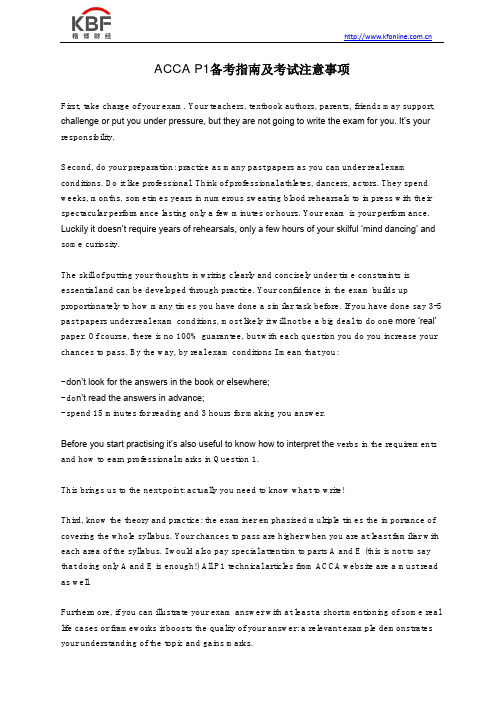
ACCA P1备考指南及考试注意事项First, take charge of your exam. Your teachers, textbook authors, parents, friends may support, challenge or put you under pressure, but they are not going to write the exam for you. It’s your responsibility.Second, do your preparation: practice as many past papers as you can under real exam conditions. Do it like professional. Think of professional athletes, dancers, actors. They spend weeks, months, sometimes years in numerous sweating blood rehearsals to impress with their spectacular performance lasting only a few minutes or hours. Your exam is your performance. Luckily it doesn’t require years of rehearsals, only a few hours of your skilful ‘mind dancing’ and some curiosity.The skill of putting your thoughts in writing clearly and concisely under time constraints is essential and can be developed through practice. Your confidence in the exam builds up proportionately to how many times you have done a similar task before. If you have done say 3-5 past papers under real exam conditions, most likely it will not be a big deal to do on e more ‘real’ paper. Of course, there is no 100% guarantee, but with each question you do you increase your chances to pass. By the way, by real exam conditions I mean that you:- don’t look for the answers in the book or elsewhere;- do n’t read the answers in advance;- spend 15 minutes for reading and 3 hours for making you answer.Before you start practising it’s also useful to know how to interpret the verbs in the requirements and how to earn professional marks in Question 1.This brings us to the next point: actually you need to know what to write!Third, know the theory and practice: the examiner emphasised multiple times the importance of covering the whole syllabus. Your chances to pass are higher when you are at least familiar with each area of the syllabus. I would also pay special attention to parts A and E (this is not to say that doing only A and E is enough!) All P1 technical articles from ACCA website are a must read as well.Furthermore, if you can illustrate your exam answer with at least a short mentioning of some real life cases or frameworks it boosts the quality of your answer: a relevant example demonstrates your understanding of the topic and gains marks.Some students, curious more than average, follow their teachers’ advice and happ ily discover that corporate governance exists not only in P1 textbook: corporate annual reports, business news, national and international corporate governance regulations (e.g., the UK Corporate Governance code, ICGN and OECD codes, the <IR> framework and many other real life examples*).The happiest of them discover this long before the exam date. And the most curious and luckiest have all the chances to become champions. Becoming lucky is not that hard: you just work on increasing your chances of success (see the second point how to do it). However, very few people dare to go for this as the majority believes ‘it’s boring’ or ‘it takes too much time’.When your time is limited the best strategy is at least to do enough for getting pass. So make sure that:- you have covered all parts of the syllabus;- you know well the key corporate governance topics: underpinning principles, agency, the board of directors and reporting; internal controls and internal audit issues related to governance; the risk management framework (including the process, the strategies, responsibilities); ethical theories, corporate and professional ethics;- you have at least briefly reviewed some of real frameworks, e.g. the UK Corporate Governance code, the UK FRC Guidance on Board Effectiveness, etc.;- you have practised 5-6 past papers with at least 3 of them under real exam conditions;- during the practice you have followed all MUST DOs in the exam; if not, adjust accordingly and repeat one more time.MUST DOs in the exam:- 1.6 minute per mark (1.5 is also fine!)- no ‘just-one-more-minute-to-finish-this’: drop it now if the time has lapsed, get back if you still have time later;- attempt all parts of all questions required (1 in part A and 2 in part B), not more, not less!- start with your ‘fat pet questions’: the largest number of marks available for your favourite topic;- start each part of an answer (e.g., a, b, c) from a new page;- leave blank lines between paragraphs and leave more blank space if you plan to return to this answer later.The only one excuse for not following these rules is if you decide not to pass P1. But then you probably would not be reading this article.Finally, for the remaining few weeks make a realistic plan: how many hours you are ready to spend each week on preparation and follow it. You are already creating your own exam outcomes with every question answered, with every article read, with every example thought of. Just like dancers contribute to their successful performance with each rehearsal. So dance well!I wish everyone a fruitful preparation and good luck in the exams!*A recent BP’s oil spill (luckily not as massive as Deepwater Horizon oil rig collapse in 2010, which later served as a plot for December 2011 Question 1 Coastal Oil) can be used for illustrating environmental footprint. Mitsubishi emissions test scandal and the Volkswagen case last year can reflect numerous issues starting from environmental issues and social responsibility and ending with risk management and governance. Infamous Daraprim price rise and subsequent rescinding last year pictures what happens if a CEO with a ‘pristine capitalist’ view and high risk appetite starts running a pharmaceutical company. Apple Music software erasing music files from customers’ hard drives can illustrate well correlation between product and reputation risks and also shows that what is legal can be sometimes far from ethical. These are just few random examples I have picked up from the news. If you start thinking about how events in the business world or around you may relate to corporate governance, risk and ethics, you might be surprised by how many connections you find. As one of my students said, she ‘has opened the whole new world in preparation for P1’.。
acca 考试知识点
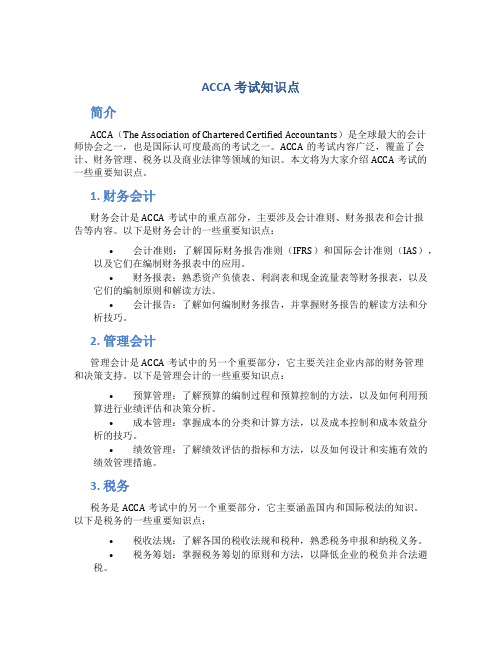
ACCA 考试知识点简介ACCA(The Association of Chartered Certified Accountants)是全球最大的会计师协会之一,也是国际认可度最高的考试之一。
ACCA的考试内容广泛,覆盖了会计、财务管理、税务以及商业法律等领域的知识。
本文将为大家介绍ACCA考试的一些重要知识点。
1. 财务会计财务会计是ACCA考试中的重点部分,主要涉及会计准则、财务报表和会计报告等内容。
以下是财务会计的一些重要知识点:•会计准则:了解国际财务报告准则(IFRS)和国际会计准则(IAS),以及它们在编制财务报表中的应用。
•财务报表:熟悉资产负债表、利润表和现金流量表等财务报表,以及它们的编制原则和解读方法。
•会计报告:了解如何编制财务报告,并掌握财务报告的解读方法和分析技巧。
2. 管理会计管理会计是ACCA考试中的另一个重要部分,它主要关注企业内部的财务管理和决策支持。
以下是管理会计的一些重要知识点:•预算管理:了解预算的编制过程和预算控制的方法,以及如何利用预算进行业绩评估和决策分析。
•成本管理:掌握成本的分类和计算方法,以及成本控制和成本效益分析的技巧。
•绩效管理:了解绩效评估的指标和方法,以及如何设计和实施有效的绩效管理措施。
3. 税务税务是ACCA考试中的另一个重要部分,它主要涵盖国内和国际税法的知识。
以下是税务的一些重要知识点:•税收法规:了解各国的税收法规和税种,熟悉税务申报和纳税义务。
•税务筹划:掌握税务筹划的原则和方法,以降低企业的税负并合法避税。
•跨境税务:了解国际税收规则和税务协定,熟悉跨境投资和跨国企业的税务管理。
4. 商业法律商业法律是ACCA考试中的另一个重要部分,它主要关注企业的法律责任和合规要求。
以下是商业法律的一些重要知识点:•合同法:了解合同的要素和成立条件,熟悉合同的解释和履行要求。
•公司法:掌握公司设立和运营的法律规定,了解公司治理和股东权益保护的相关法律。
ACCA考试《专业会计师P1》复习详解5
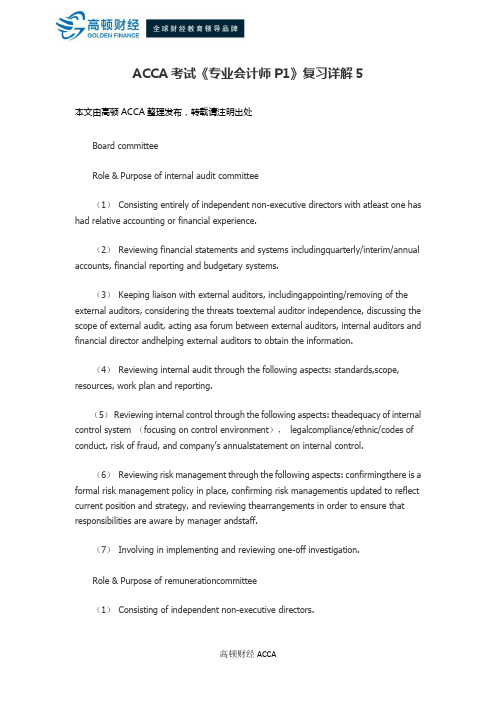
ACCA考试《专业会计师P1》复习详解5本文由高顿ACCA整理发布,转载请注明出处Board committeeRole & Purpose of internal audit committee(1)Consisting entirely of independent non-executive directors with atleast one has had relative accounting or financial experience.(2)Reviewing financial statements and systems includingquarterly/interim/annual accounts, financial reporting and budgetary systems.(3)Keeping liaison with external auditors, includingappointing/removing of the external auditors, considering the threats toexternal auditor independence, discussing the scope of external audit, acting asa forum between external auditors, internal auditors and financial director andhelping external auditors to obtain the information.(4)Reviewing internal audit through the following aspects: standards,scope, resources, work plan and reporting.(5)Reviewing internal control through the following aspects: theadequacy of internal control system (focusing on control environment),legalcompliance/ethnic/codes of conduct, r isk of fraud, and company’s annualstatement on internal control.(6)Reviewing risk management through the following aspects: confirmingthere is a formal risk management policy in place, confirming risk managementis updated to reflect current position and strategy, and reviewing thearrangements in order to ensure that responsibilities are aware by manager andstaff.(7)Involving in implementing and reviewing one-off investigation.Role & Purpose of remunerationcommittee(1)Consisting of independent non-executive directors.(2)In charge of determining general remunerations policy on executivedirectors.(3)Determining specific remuneration package for each director.(4)Reporting to the shareholders about remuneration policy andpackages of individual directors.Role & Purpose of nominationcommittee(1)Overseeing the process for board appointments and make recommendationsto the board.(2)Reviewing regularly the structure, size and composition of theboard. Ensure appropriate management diversity to board composition.(3)Evaluating regularly the balance of skills, knowledge andexperience of the board. Consider the balance between executive director andnon-executive directors.(4)Consider issues relating to re-election and reappointment ofdirectors.Role & Purpose of riskcommittee(1)Approving the organization’s risk management strategy and riskmanagement policy.(2)Reviewing reports on key risks prepared by business operatingunits, management and the board.(3)Monitoring overall exposure to risk and ensuring it remains withinlimits set by the board.(4)Assessing the effectiveness of the organization’s risk managementsystems.(5)Providing early warning to the board on emerging risk issues andsignificant changes in the company’s exposure to risks.(6)Reviewing the company’s statement in conjunction with the auditcommittee, on internal control with reference to risk management.Director’sremunerationRemuneration policy& strategy(Remuneration policy)(1)Pay scales applied to each director’s package.(2)Proportion of different types of reward within each package.(3)What proportion of rewards should be related to measurableperformance.(4)Transparency o f directors’ remuneration.(5)Period within which performance related elements become payable.(Remuneration strategy)(1)Board is motivated to strive to increase performance and adequatelyrewarded when performance improvements are achieved.(2)Board is seen to be paid appropriately for their efforts andsuccess, and not be criticized for excessive pay.(3)Remuneration strategy should create a link to corporate strategy.To what extent it links is a measure of the remuneration strategy’s success.(4)Remuneration strategy should consider problems such as choice ofwrong measure, excessive focus on short-term results.(5)Remuneration strategy should consider encouraging long-term loyaltythrough share purchases schemes, the availability of company resources, morebenefit in kind for lower basic salary.Remuneration packages(Basic salary)Is not related to performance, but is determinedthrough benchmarking peer group salary, which how much other companies might beprepared to pay.(Performance related bonuses)It is elements of remuneration dependent onthe achievement of some of performance measurement criteria, such as cash bonus.(Shares & share options)(1)Share options are the most common form of long-term incentivescheme. It gives directors the right to buy shares at a specified exerciseprice over a specified time period in the future. If the stock price rises sothat it exceeds the exercise price by the time the option can be exercised,directors can buy at lower price than market price and then might sell it at aprofit.(2)Share options can be used to give the executive the incentive tomanage the company in sch a way that share price rises so that it alignsmanagement and shareholder interests. This alignment would, in theory, overcomethe agency problem.(Benefits in kind & Pensions)(1)Benefits in kind are various non-wage compensations provided todirectors and employees in addition to their normal wages or salaries such aslife insurance, company car scheme, holidays, and loans.(2)There may be separate pension scheme available for directors athigher rates than for employees.Other Issues associated with directors’ remuneration(Legal)(1)Considering compensation for the directors in the case of earlytermination.(2)Aiming to avoid rewarding poor performance.(Ethical)(1)Public reaction to high profile corporation failure where directorswere receiving what was perceived as excessive remuneration in relation totheir performance.(2)Recent changes to best practice disclosure requirements on boardstructure and executive pay.(3)Incorporating business ethics into performance-related remunerationsystem.(Competitive)(1)It is vital for a company to have a proficient, motivated board ofdirectors working for the interest of shareholders.(2)Shareholders should provide the company with resources to recruitand retain directors under competitive terms.(Regulatory)(1)Directors need to submit a remuneration report to members at theannual general meeting each year.(2)The report must provide full details of directors’ remuneration,and should be clear, transparent and understandable to shareholders.(3)When an executive director serves as a non-executive directorelsewhere, the remuneration report should state whether or not the remunerationof that director will retain and what the remuneration is.(4)The increasingly regulatory environment reflects the additionaldemand on and responsibilities of directors, and the heightened externalscrutiny to the remuneration of directors.更多ACCA资讯请关注高顿ACCA官网:。
会计学acca知识点

会计学acca知识点是一门关于财务信息和经济活动分析的学科,对于企业和个人来说,知识无疑是非常重要的。
而ACCA(Association of Chartered Certified Accountants)则是世界上最具影响力的会计师组织之一,它提供了全球范围内的会计师资格认证。
一、概述研究财务信息的获取、处理和传播过程,旨在提供决策所需的有关数据。
主要有两个分支,分别是财务会计和管理会计。
财务会计关注的是企业的财务信息披露,目的是向内外部利益相关者提供有关企业财务状况和经营成果的信息。
财务会计的核心原则包括会计等式、会计周期和会计准则等。
管理会计则主要关注企业内部的决策支持,通过提供成本分析、预算控制、绩效评估等信息帮助企业管理者制定决策。
管理会计的主要工具包括成本核算、预算管理和绩效评估等。
二、ACCA资格认证介绍ACCA资格认证是全球范围内最具权威性的会计师资格之一。
通过ACCA考试取得资格认证,会计师可以在全球范围内充当财务顾问、审计师和管理会计师等角色。
ACCA考试分为四个阶段,分别是基础阶段、专业阶段、基本技能阶段和专业技能阶段。
基础阶段主要包括Accountant in Business、Management Accounting和Financial Accounting三门课程的考试,专业阶段包括Corporate and Business Law、Performance Management、Taxation、Financial Reporting、Audit and Assurance、Financial Management、Strategic Business Leader和Strategic Business Reporting等课程的考试。
通过这些考试,会计师可以全面掌握财务会计和管理会计的相关知识。
三、财务会计重要知识点财务会计涉及众多知识点,下面将介绍其中一些重要的知识点。
ACCA《P1专业会计师》考试复习指导5
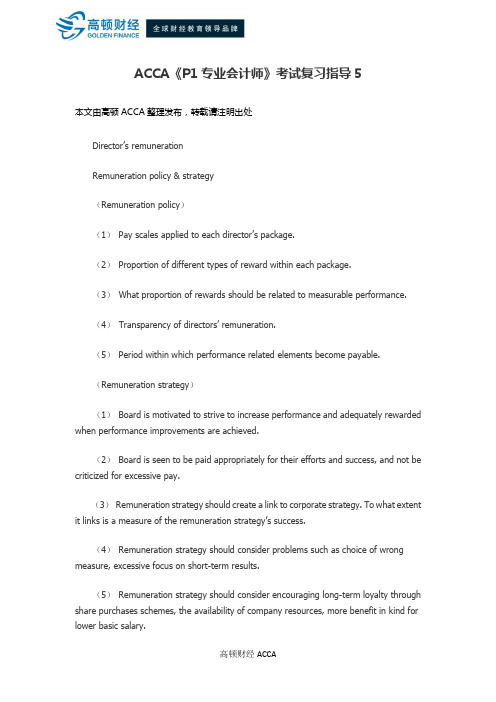
ACCA《P1专业会计师》考试复习指导5本文由高顿ACCA整理发布,转载请注明出处Director’s remunerationRemuneration policy & strategy(Remuneration policy)(1)Pay scales applied to each director’s package.(2)Proportion of different types of reward within each package.(3)What proportion of rewards should be related to measurable performance.(4)Transparency of directors’ remuneration.(5)Period within which performance related elements become payable.(Remuneration strategy)(1)Board is motivated to strive to increase performance and adequately rewarded when performance improvements are achieved.(2)Board is seen to be paid appropriately for their efforts and success, and not be criticized for excessive pay.(3)Remuneration strategy should create a link to corporate strategy. To what extent it links is a measure of the remuneration strategy’s success.(4)Remuneration strategy should consider problems such as choice of wrong measure, excessive focus on short-term results.(5)Remuneration strategy should consider encouraging long-term loyalty through share purchases schemes, the availability of company resources, more benefit in kind for lower basic salary.Remuneration packages(Basic salary)Is not related to performance, but is determined through benchmarking peer group salary, which how much other companies might be prepared to pay.(Performance related bonuses)It is elements of remuneration dependent on the achievement of some of performance measurement criteria, such as cash bonus.(Shares & share options)(1)Share options are the most common form of long-term incentive scheme. It gives directors the right to buy shares at a specified exercise price over a specified time period in the future. If the stock price rises so that it exceeds the exercise price by the time the option can be exercised, directors can buy at lower price than market price and then might sell it at a profit.(2)Share options can be used to give the executive the incentive to manage the company in sch a way that share price rises so that it aligns management and shareholder interests. This alignment would, in theory, overcome the agency problem.(Benefits in kind & Pensions)(1)Benefits in kind are various non-wage compensations provided to directors and employees in addition to their normal wages or salaries such as life insurance, company car scheme, holidays, and loans.(2)There may be separate pension scheme available for directors at higher rates than for employees.Other Issues associated with directors’ remuneration(Legal)(1)Considering compensation for the directors in the case of early termination.(2)Aiming to avoid rewarding poor performance.(Ethical)(1)Public reaction to high profile corporation failure where directors were receiving what was perceived as excessive remuneration in relation to their performance.(2)Recent changes to best practice disclosure requirements on board structure and executive pay.(3)Incorporating business ethics into performance-related remuneration system.(Competitive)(1)It is vital for a company to have a proficient, motivated board of directors working for the interest of shareholders.(2)Shareholders should provide the company with resources to recruit and retain directors under competitive terms.(Regulatory)(1)Directors need to submit a remuneration report to members at the annual general meeting each year.(2)The report must provide full details of di rectors’ remuneration, and should be clear, transparent and understandable to shareholders.(3)When an executive director serves as a non-executive director elsewhere, the remuneration report should state whether or not the remuneration of that director will retain and what the remuneration is.(4)The increasingly regulatory environment reflects the additional demand on and responsibilities of directors, and the heightened external scrutiny to the remuneration of directors.Social responsibility in corporation governanceCarroll’s Four-part model(Economic responsibilities)(1)Company has the responsibility to shareholders who demand a reasonable return.(2)Company has the responsibility to employees who want fair employment conditions.(3)Company has the responsibility to customers who seek good-quality goods at fair prices.(Legal responsibilities)(1)Company has the responsibility to obey laws since law is the base line for companies operating with society.(2)The law is an acceptable rule book for company operation.(Ethical responsibilities)Company has the responsibility to act in a fair and just way even if the law doesn’t compel them to do so.更多ACCA资讯请关注高顿ACCA官网:。
acca考试知识点总结
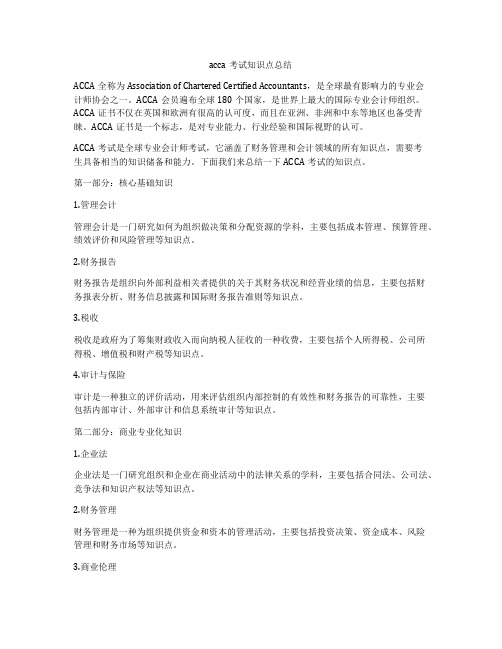
acca考试知识点总结ACCA全称为Association of Chartered Certified Accountants,是全球最有影响力的专业会计师协会之一。
ACCA会员遍布全球180个国家,是世界上最大的国际专业会计师组织。
ACCA证书不仅在英国和欧洲有很高的认可度,而且在亚洲、非洲和中东等地区也备受青睐。
ACCA证书是一个标志,是对专业能力、行业经验和国际视野的认可。
ACCA考试是全球专业会计师考试,它涵盖了财务管理和会计领域的所有知识点,需要考生具备相当的知识储备和能力。
下面我们来总结一下ACCA考试的知识点。
第一部分:核心基础知识1.管理会计管理会计是一门研究如何为组织做决策和分配资源的学科,主要包括成本管理、预算管理、绩效评价和风险管理等知识点。
2.财务报告财务报告是组织向外部利益相关者提供的关于其财务状况和经营业绩的信息,主要包括财务报表分析、财务信息披露和国际财务报告准则等知识点。
3.税收税收是政府为了筹集财政收入而向纳税人征收的一种收费,主要包括个人所得税、公司所得税、增值税和财产税等知识点。
4.审计与保险审计是一种独立的评价活动,用来评估组织内部控制的有效性和财务报告的可靠性,主要包括内部审计、外部审计和信息系统审计等知识点。
第二部分:商业专业化知识1.企业法企业法是一门研究组织和企业在商业活动中的法律关系的学科,主要包括合同法、公司法、竞争法和知识产权法等知识点。
2.财务管理财务管理是一种为组织提供资金和资本的管理活动,主要包括投资决策、资金成本、风险管理和财务市场等知识点。
3.商业伦理商业伦理是一种研究商业活动中道德规范和价值观的学科,主要包括道德决策、企业社会责任和道德风险管理等知识点。
4.财务分析财务分析是一种评估组织财务状况和经营业绩的方法,主要包括财务比率分析、现金流量分析和经济附加值分析等知识点。
以上就是ACCA考试的知识点总结,希望对考生有所帮助。
在备考过程中,考生需要充分理解和掌握这些知识点,并且进行大量的练习和模拟考试,才能在考试中取得好成绩。
